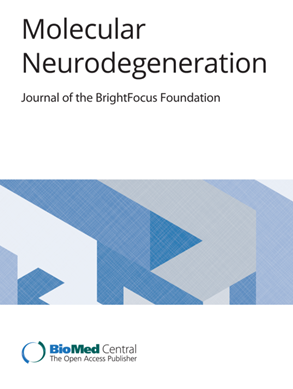Preclinical studies and transcriptome analysis in a model of Parkinson’s disease with dopaminergic ZNF746 expression
IF 14.9
1区 医学
Q1 NEUROSCIENCES
引用次数: 0
Abstract
The parkin-interacting substrate (PARIS, also known as ZNF746) is a transcriptional repressor, whose accumulation and phosphorylation play central pathological roles in Parkinson’s disease (PD). PARIS-induced transcriptional repression of PGC-1α or MDM4 contributes to mitochondrial dysfunction and p53-dependent neuron loss in PD. Despite the important role of PARIS in PD pathogenesis, unbiased transcriptomic profiles influenced by PARIS accumulation in dopaminergic neurons remain unexplored. We engineered Tet-Off conditional transgenic mice expressing PARIS in dopaminergic neurons, driven by DAT-PF-tTA driver mice. The conditional PARIS transgenic mice were characterized by PD-associated pathologies, including progressive dopamine cell loss, neuroinflammation, PGC-1α repression, and mitochondrial proteome alteration. Motor impairment was assessed using pole and rotarod tests. L-DOPA and c-Abl inhibitors were administered to PARIS transgenic mice to evaluate their therapeutic efficacy. The transcriptomic profiles and gene ontology clusters were analyzed by bulk and single-nucleus RNA-seq for the ventral midbrains from PARIS transgenic and age-matched controls. Conditional dopaminergic PARIS expression in mice led to the robust and selective dopaminergic neuron degeneration, neuroinflammation, and striatal dopamine deficits, resulting in L-DOPA-responsive motor impairments. Consistent with the results of previous reports, PARIS suppressed dopaminergic PGC-1α expression, disturbed mitochondrial marker protein expression, and reduced COXIV-labeled mitochondria in dopamine neurons. Pharmacological inhibition of c-Abl activity in PARIS transgenic mice largely prevents PD-associated pathological features. Unbiased transcriptomic analysis revealed PARIS-regulated differentially expressed genes (DEGs), both collectively and in a cell-type-specific manner, along with enriched biological pathways linked to PD pathogenesis. Single-cell resolution transcriptomic analysis confirmed repression of PGC-1α and several mitochondria-related target genes in dopaminergic cells. Additionally, we identified distinct glial cell subpopulations and DEGs associated with PD pathogenesis. Conditional PARIS transgenic mice recapitulate robust and dopaminergic neuron-selective pathological features of PD, allowing the preclinical evaluation of antisymptomatic and disease-modifying therapeutic strategies within a couple of months. Based on this new PD mouse model, we provide unbiased bulk and single-nucleus transcriptomic profiles that are regulated by PARIS and potentially contribute to PD pathogenesis. A PD mouse model with flexible pathology induction capacity and a whole transcriptome could serve as a useful resource for translational PD research.多巴胺能ZNF746表达帕金森病模型的临床前研究和转录组分析
帕金森氏病相互作用底物(PARIS,也称为ZNF746)是一种转录抑制因子,其积累和磷酸化在帕金森氏病(PD)中起核心病理作用。paris诱导的PGC-1α或MDM4的转录抑制有助于帕金森病的线粒体功能障碍和p53依赖性神经元丢失。尽管PARIS在PD发病机制中发挥着重要作用,但多巴胺能神经元中PARIS积累影响的无偏倚转录组谱仍未被探索。我们设计了在多巴胺能神经元中表达PARIS的et- off条件转基因小鼠,由DAT-PF-tTA驱动小鼠驱动。条件PARIS转基因小鼠表现出pd相关病理,包括进行性多巴胺细胞丢失、神经炎症、PGC-1α抑制和线粒体蛋白质组改变。采用极和旋转杆试验评估运动障碍。将L-DOPA和c-Abl抑制剂给予PARIS转基因小鼠,观察其治疗效果。通过散装和单核RNA-seq分析了来自PARIS转基因和年龄匹配对照的腹中脑的转录组学特征和基因本体聚类。小鼠条件性多巴胺能PARIS表达导致多巴胺能神经元强而选择性变性、神经炎症和纹状体多巴胺缺失,导致左旋多巴反应性运动障碍。与先前报道的结果一致,PARIS抑制多巴胺能PGC-1α的表达,干扰线粒体标记蛋白的表达,减少多巴胺神经元中coxiv标记的线粒体。PARIS转基因小鼠的c-Abl活性的药理抑制在很大程度上阻止了pd相关的病理特征。无偏倚转录组学分析揭示了paris调控差异表达基因(DEGs),无论是集体的还是以细胞类型特异性的方式,以及与PD发病机制相关的丰富的生物学途径。单细胞分辨率转录组分析证实PGC-1α和几个线粒体相关靶基因在多巴胺能细胞中受到抑制。此外,我们确定了与PD发病机制相关的不同胶质细胞亚群和deg。条件PARIS转基因小鼠重现PD的稳健和多巴胺能神经元选择性病理特征,允许在几个月内对抗症状和改善疾病的治疗策略进行临床前评估。基于这种新的PD小鼠模型,我们提供了由PARIS调控的无偏体和单核转录组谱,这些转录组谱可能有助于PD的发病机制。一个具有灵活的病理诱导能力和完整转录组的PD小鼠模型可以为翻译性PD研究提供有用的资源。
本文章由计算机程序翻译,如有差异,请以英文原文为准。
求助全文
约1分钟内获得全文
求助全文
来源期刊

Molecular Neurodegeneration
医学-神经科学
CiteScore
23.00
自引率
4.60%
发文量
78
审稿时长
6-12 weeks
期刊介绍:
Molecular Neurodegeneration, an open-access, peer-reviewed journal, comprehensively covers neurodegeneration research at the molecular and cellular levels.
Neurodegenerative diseases, such as Alzheimer's, Parkinson's, Huntington's, and prion diseases, fall under its purview. These disorders, often linked to advanced aging and characterized by varying degrees of dementia, pose a significant public health concern with the growing aging population. Recent strides in understanding the molecular and cellular mechanisms of these neurodegenerative disorders offer valuable insights into their pathogenesis.
 求助内容:
求助内容: 应助结果提醒方式:
应助结果提醒方式:


